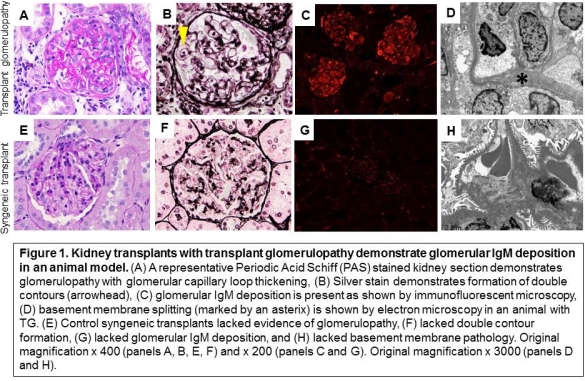Transplant Glomerulopathy in a Novel Model of Chronic Antibody Mediated Rejection Is Associated With DSA and Glomerular IgM
1Medicine, University of Wisconsin Madison, Madison, WI
2Pathology, University of Wisconsin Madison, Madison, WI.
Meeting: 2015 American Transplant Congress
Abstract number: C10
Keywords: Antibodies, Histology, Rejection
Session Information
Session Name: Poster Session C: Antigen Presenting Cells in Alloimmune Responses/B Cells and Antibody in Alloimmune Responses
Session Type: Poster Session
Date: Monday, May 4, 2015
Session Time: 5:30pm-6:30pm
 Presentation Time: 5:30pm-6:30pm
Presentation Time: 5:30pm-6:30pm
Location: Exhibit Hall E
Purpose
Chronic active antibody mediated rejection (cAMR) and transplant glomerulopathy (TG) are major determinants of long-term allograft survival. However, the contribution of DSA and glomerular immunoglobulins to the pathogenesis of cAMR and TG remains unclear. We evaluated these parameters in a novel rat model of cAMR.
Methods
Kidney transplantation was performed in a control group of syngeneic Lewis rats (N=4) and in an experimental group of MHC mismatched Fischer donor to Lewis rat recipients (N=8). To prevent acute rejection, recipients were treated with 5 mg/kg/d cyclosporine for 10 days post-transplant. Samples were harvested at 6 months following transplant.
Results
87.5% of allogeneic kidney transplant recipients developed cAMR according to Banff 2013 criteria. This was evidenced by mean scores of cg=1.625±1.302, ptc + g=2.50±0.93, and IgG DSA=5824±1758 MFI, all of which were significantly greater than levels in the syngeneic transplants. In addition, we evaluated a chronicity score defined by cg + ct + cv + ct, which was greater than the control group (3.375±2.264 versus 0±0, p=0.02). Notably, levels of IgG DSA correlated with the degree of mvi (R2=0.95, p=0.03). Animals with cAMR had worse proteinuria compared to controls (p=0.05). Additionally, immunofluorescence demonstrated higher levels of glomerular IgM in animals with TG compared to controls (3.72±1.87% versus 1.48±0.23%, p=0.05).

| cg | ptc + g | Chronicity score | IgG DSA (MFI) | Glomerular IgM (%) | Proteinuria (UP/Cr) | |
| Syngeneic controls | 0±0 | 0±0 | 0±0 | 2238±84 | 1.48±0.23 | 0.10±0.08 |
| Allogeneic transplants | 1.625±1.302 | 2.5±0.93 | 3.375±2.264 | 5824±1758 | 3.72±1.87 | 3.56±3.05 |
| P value | 0.04 | 0.0004 | 0.02 | 0.03 | 0.04 | 0.05 |
Conclusions
We demonstrate a novel rat model of cAMR in which the animals develop TG, which was associated with IgG DSA, microvascular injury, and glomerular IgM deposition. These findings suggest mechanisms involving DSA and glomerular IgM contribute to the development of TG. These findings have implications to identify predictors of poor graft outcomes and potential therapeutic targets.
To cite this abstract in AMA style:
Panzer S, Reese S, Schlei NWilson, Zhong W, Djamali A. Transplant Glomerulopathy in a Novel Model of Chronic Antibody Mediated Rejection Is Associated With DSA and Glomerular IgM [abstract]. Am J Transplant. 2015; 15 (suppl 3). https://atcmeetingabstracts.com/abstract/transplant-glomerulopathy-in-a-novel-model-of-chronic-antibody-mediated-rejection-is-associated-with-dsa-and-glomerular-igm/. Accessed February 16, 2026.« Back to 2015 American Transplant Congress
